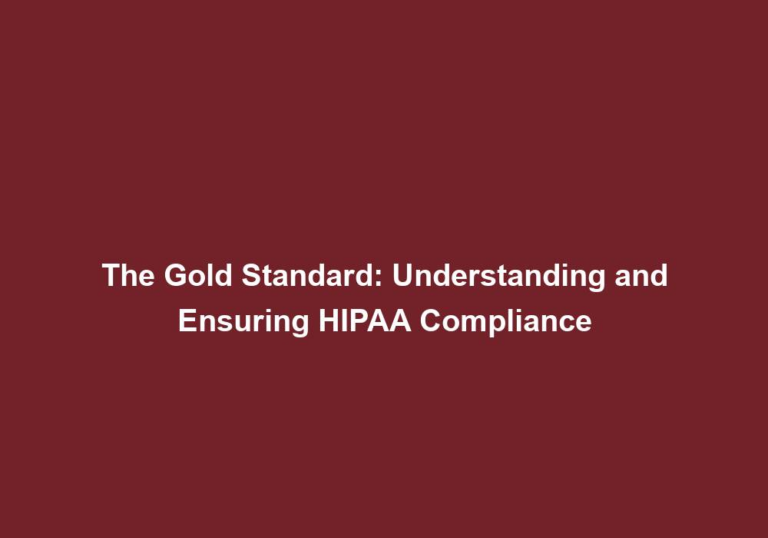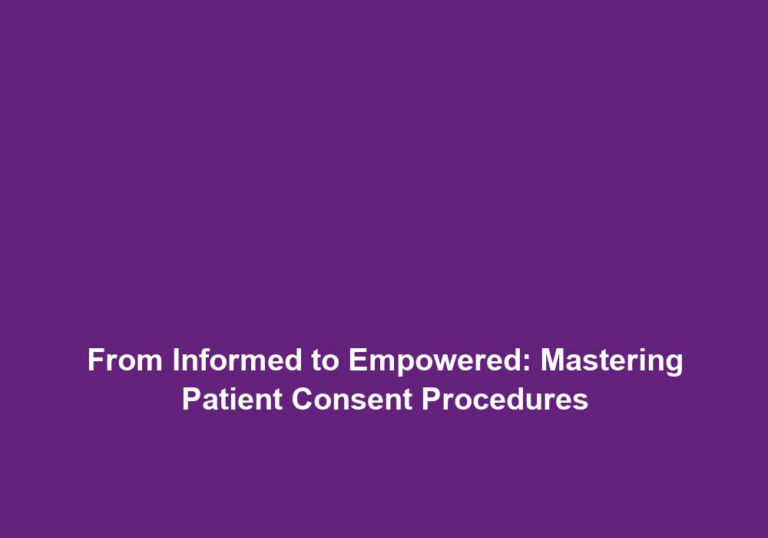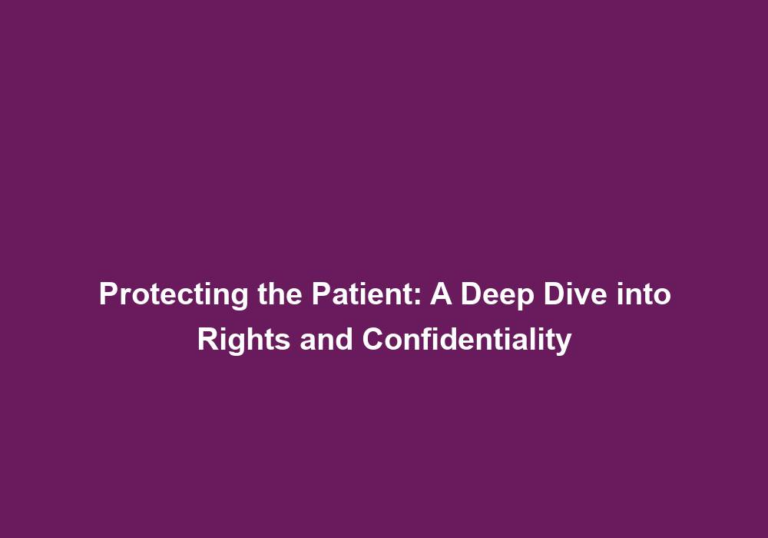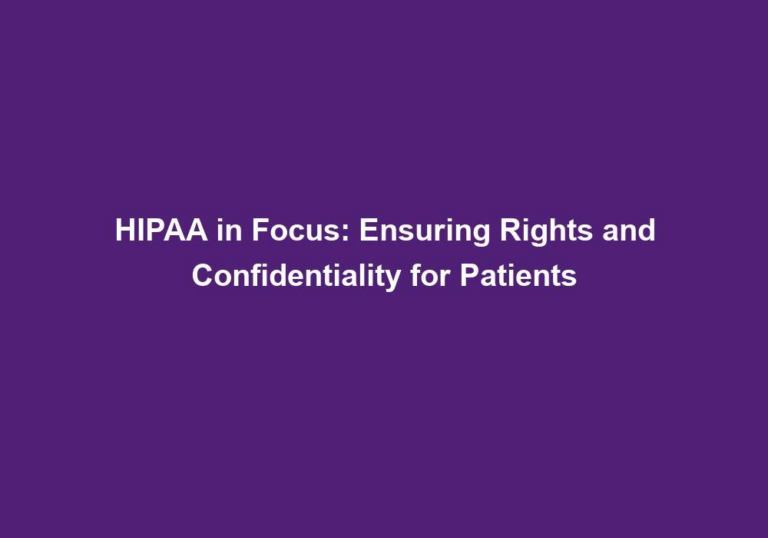Consent in Care: Ensuring Patient Rights and Understanding
In the healthcare industry, consent plays a crucial role in establishing a respectful and ethical relationship between healthcare providers and patients. It is essential for healthcare professionals to prioritize patient rights and understanding when obtaining consent for medical treatments, procedures, or research participation. This article will delve into the significance of consent in healthcare, discuss the various types of consent, and highlight the key elements of informed consent.
The Importance of Consent in Healthcare
Consent serves as a fundamental principle in healthcare, upholding the autonomy and dignity of patients. It ensures that individuals have the right to make decisions about their own bodies, including the ability to accept or decline medical interventions. By obtaining informed consent, healthcare professionals demonstrate respect for the patient’s right to self-determination and provide them with the necessary information to make informed choices regarding their care.
Types of Consent
- Express Consent: Express consent is obtained when patients clearly and explicitly provide their consent for a specific medical treatment or procedure. It can be given orally or in writing, depending on the healthcare provider’s protocols and the nature of the intervention. Express consent is generally obtained through the use of consent forms, which outline the potential risks, benefits, and alternatives of the proposed treatment.
- Express consent is important in ensuring that patients have a clear understanding of the procedure or treatment they are consenting to. It allows healthcare providers to inform patients about the potential risks and benefits, as well as any alternative options available to them.
- Express consent can be obtained through written consent forms, which serve as a record of the patient’s agreement to the treatment plan. These forms provide a clear and documented record of the patient’s consent, which can be referenced in the future if needed.
- Oral consent can also be obtained in certain situations, such as in emergency cases where immediate treatment is necessary. In such cases, healthcare providers must ensure that the patient fully understands the nature of the treatment and provides their consent verbally.
- Implied Consent: Implied consent is inferred from the patient’s actions or behavior. It is typically used in situations where emergency medical interventions are required and the patient is unable to provide express consent. For example, if an unconscious patient arrives at the emergency department, healthcare professionals may assume implied consent to administer life-saving treatments.
- Implied consent is crucial in emergency situations where immediate medical intervention is necessary to save a patient’s life or prevent further harm. In these cases, healthcare providers must act quickly and make decisions based on what is in the best interest of the patient.
- Implied consent is based on the principle that a reasonable person would consent to the necessary medical intervention in the same situation. Healthcare providers must use their professional judgment to determine what actions are necessary to provide appropriate care.
- Informed Consent: Informed consent is the gold standard in healthcare, emphasizing the importance of providing patients with comprehensive information about their treatment options. It involves a detailed discussion between the healthcare provider and the patient, ensuring that the patient understands the purpose, risks, benefits, and alternatives of the proposed intervention. Informed consent requires patients to have the capacity to make decisions and the ability to comprehend the provided information.
- Informed consent is a crucial aspect of patient-centered care, as it empowers patients to actively participate in their healthcare decision-making process. By providing patients with comprehensive information about their treatment options, healthcare providers enable them to make informed choices that align with their values and preferences.
- The process of obtaining informed consent involves a detailed discussion between the healthcare provider and the patient. This discussion should cover all relevant information about the proposed intervention, including the purpose, potential risks and benefits, and any alternative treatments available.
- Healthcare providers must ensure that patients have the capacity to make decisions and understand the information provided. This may involve assessing factors such as the patient’s age, cognitive abilities, and mental health. If a patient lacks the capacity to provide informed consent, healthcare providers may need to seek consent from authorized representatives, such as parents or legal guardians.
Key Elements of Informed Consent
To ensure the validity and ethicality of informed consent, several key elements must be present during the consent process:
- Voluntariness: Informed consent should be obtained voluntarily, without any coercion, pressure, or manipulation. Patients should feel free to decline or accept the proposed treatment based on their personal preferences and beliefs.
- Healthcare providers must ensure that patients feel comfortable and empowered to make decisions about their care. Patients should never feel forced or pressured into consenting to a treatment or procedure.
- It is important for healthcare providers to create a supportive and non-judgmental environment that encourages open communication and respects the autonomy of the patient.
- Capacity: Patients must have the capacity to understand the information provided and make decisions about their care. Healthcare professionals should assess the patient’s ability to comprehend the risks, benefits, and alternatives of the treatment and consider factors like age, cognitive abilities, and mental health.
- Healthcare providers must evaluate the patient’s capacity to make decisions and understand the information provided. This may involve assessing the patient’s cognitive abilities, mental health, and any factors that may impact their ability to comprehend the information.
- If a patient lacks the capacity to provide informed consent, healthcare providers may need to involve authorized representatives, such as parents or legal guardians, in the decision-making process.
- Disclosure: The healthcare provider has an ethical obligation to disclose all relevant information about the proposed intervention, including potential risks, benefits, and alternative treatments. The disclosure should be tailored to the patient’s specific needs, ensuring they comprehend the information provided.
- Healthcare providers must provide clear and comprehensive information about the proposed intervention, including the potential risks, benefits, and any alternative treatments available. The information should be tailored to the patient’s specific needs and presented in a manner that they can understand.
- It is important for healthcare providers to be transparent and honest when disclosing information to patients. Patients have the right to know all relevant information that may impact their decision-making process.
- Comprehension: Patients should have a clear understanding of the information disclosed to them. Healthcare professionals can employ various strategies, such as using simple language, visual aids, and allowing ample time for questions, to enhance patient comprehension.
- Healthcare providers should use clear and simple language when discussing treatment options with patients. Avoiding medical jargon and providing visual aids can help enhance patient comprehension and ensure they have a clear understanding of the information provided.
- It is important for healthcare providers to allow ample time for patients to ask questions and seek clarification. Patients should feel comfortable expressing their concerns and seeking additional information before making a decision.
- Decision-Making: Informed consent enables patients to actively participate in their healthcare decision-making process. They should be allowed sufficient time to consider their options, ask questions, and discuss concerns with their healthcare providers. The final decision should reflect the patient’s values, beliefs, and personal preferences.
- Healthcare providers should involve patients in the decision-making process and respect their values, beliefs, and personal preferences. Patients should be given sufficient time to consider their options, ask questions, and discuss any concerns they may have.
- It is important for healthcare providers to provide support and guidance to patients during the decision-making process. This may involve discussing the potential risks and benefits of each option and helping patients weigh their choices.
Best Practices for Obtaining Consent
Healthcare providers should follow best practices to ensure the proper acquisition of consent:
- Clear Communication: Use plain and understandable language when discussing treatment options with patients. Avoid medical jargon and ensure that the patient comprehends the information provided.
- Clear communication is essential in obtaining informed consent. Healthcare providers should use language that is easily understood by patients and avoid using medical jargon that may confuse or intimidate them.
- It is important for healthcare providers to check for patient understanding throughout the consent process. Encouraging patients to ask questions and providing clear explanations can help ensure that they comprehend the information provided.
- Documentation: Always document the consent process in the patient’s medical record, including the discussion, risks, benefits, alternatives, and the patient’s decision. This documentation serves as evidence that informed consent was obtained.
- Documentation is crucial in ensuring that the consent process is properly recorded and can be referenced in the future if needed. Healthcare providers should document the discussion, including the information provided, the patient’s understanding, and any questions or concerns raised.
- The documentation should also include the patient’s decision regarding the proposed intervention, whether they have given their consent or declined the treatment. This serves as evidence that informed consent was obtained and reflects the patient’s autonomy in decision-making.
- Continuous Consent: The consent process should be ongoing throughout the patient’s care journey. Healthcare providers should provide updates and obtain additional consent if treatment plans change or new interventions are introduced.
- Healthcare providers should ensure that consent is not a one-time event but an ongoing process. As treatment plans evolve or new interventions are introduced, healthcare providers should communicate these changes to the patient and obtain their updated consent.
- Continuous consent helps ensure that patients remain informed and involved in their care. It allows them to re-evaluate their options as new information becomes available and make decisions that align with their current preferences and circumstances.
- Consent for Research: When involving patients in research studies, obtaining informed consent is of utmost importance. Researchers should provide detailed information about the study purpose, procedures, potential risks, benefits, and the voluntary nature of participation.
- In research studies, informed consent is essential to protect the rights and well-being of participants. Researchers must provide comprehensive information about the study, including its purpose, procedures, potential risks and benefits, and the voluntary nature of participation.
- It is crucial for researchers to ensure that participants understand the information provided and have the opportunity to ask questions before deciding to participate. Informed consent forms specifically designed for research studies should be used to document the consent process.
- Consent for Minors or Incapacitated Individuals: In cases where the patient lacks the capacity to provide informed consent, healthcare providers should seek consent from authorized representatives, such as parents or legal guardians. However, involving the patient in decision-making discussions to the extent possible is still crucial.
- In cases where the patient is a minor or lacks the capacity to provide informed consent, healthcare providers should seek consent from authorized representatives, such as parents or legal guardians. These authorized representatives should be involved in the decision-making process and provide input based on the patient’s best interests.
- It is important for healthcare providers to involve the patient to the extent possible, considering their age, cognitive abilities, and developmental stage. Healthcare providers should ensure that the patient’s preferences and opinions are considered in the decision-making process.
In conclusion, consent in care is essential for upholding patient rights and ensuring a respectful and ethical healthcare environment. By obtaining informed consent, healthcare providers empower patients to actively participate in their healthcare decision-making process. Adhering to best practices, such as clear communication, documentation, and continuous consent, helps foster a trusting relationship between healthcare professionals and patients.







